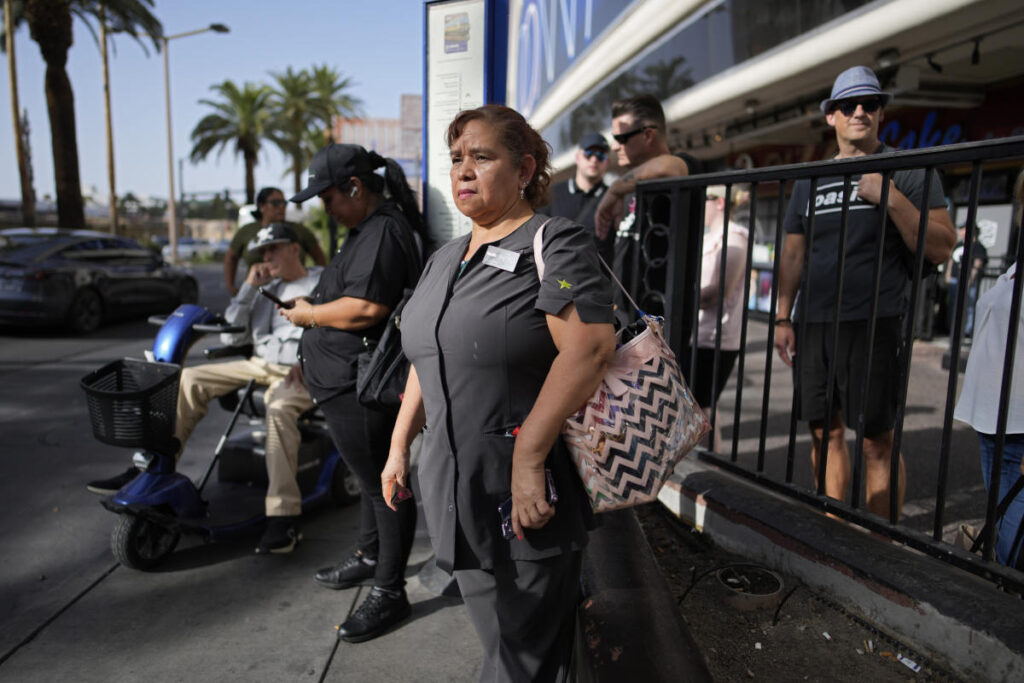At the heart of America’s rural landscape lies the Baker family ranch in eastern Nevada, symbolizing the enduring cowboy culture intertwined with agricultural productivity. With a staggering output of approximately 10,000 tons of hay annually, the ranch incorporates the vastness of the Nevada desert alongside the majestic backdrop of snow-capped mountains. However, the ranch’s survival is critically reliant on an agricultural guest worker program, which employs Mexican immigrants for large portions of the year. Janille Baker, the ranch’s accountant, expresses her frustration over the common narrative that foreign workers are taking jobs from Americans when, in her experience, finding American locals who are willing to do the arduous work in extreme temperatures is incredibly challenging. Her remarks highlight a glaring disparity: in six years, only two U.S. citizens applied for available jobs, revealing the local economic realities faced by rural businesses.
Immigration is a polarizing topic during this election cycle, taking center stage in voters’ minds amid broader national discussions. In the diverse state of Nevada, where nearly 19% of residents are foreign-born, the implications of immigration policies could significantly impact the economy. Although the rhetoric surrounding immigration tends to lean heavily towards protectionism and anti-immigration stances, the real-world complexities reveal a different story. Nevada’s economic fabric is distinctly woven with the contributions of immigrant workers, crucial within sectors such as hospitality, agriculture, and services. This creates an environment where the candidates’ stances on immigration could drastically alter the state’s future economic landscape, further complicating the dynamics between local workers, immigrants, and the employers who rely on them.
Across Nevada, from the rustic Baker ranch to the glitzy streets of Las Vegas, the immigration debate is playing out under vastly different conditions yet revealing underlying parallels. In a bustling city that attracts millions of tourists, concerns arise among immigrant workers living under the threat of deportation. For individuals like Nancy Valenzuela, a maid in Las Vegas, the looming uncertainty about their legal status generates fear, which is palpable in the community. She, alongside others, supports Vice President Kamala Harris’s calls for a pathway to citizenship for those who have established roots in the country. Meanwhile, opposing views champion the strict enforcement of laws proposed by former President Donald Trump, suggesting mass deportations, creating an atmosphere of apprehension and division.
The fear of mass deportations escalates in discussions surrounding the potential impact on the economy, particularly in Nevada. Experts warn that the displacement of millions of undocumented workers could lead to dire job losses mirroring those experienced during the 2008 financial crisis. Economists from various institutions have illustrated that substantially removing these essential workers would cripple foundational industries, triggering immediate ramifications for state economies, particularly those reliant on tourism and service sectors. This highlights a crucial dilemma; while national rhetoric often emphasizes the need for stricter border control, the detrimental consequences of such policies on local economies remain largely unacknowledged.
As candidates navigate the choppy waters of immigration policy, especially in a state like Nevada with its intricate demographics, they are attempting to balance the demand for tougher border enforcement with the acknowledgment of immigrants’ crucial roles. Kamala Harris, while promoting humane treatment of migrants, has also suggested tightening asylum protocols, reflecting a common ground desired by constituents from both parties—though this may be at odds with the experiences of those directly affected. Immigrant justice advocates like Erika Marquez point out that the predominant focus on border security detracts from addressing the lived realities of long-term residents who contribute to society yet remain in precarious legal situations.
At the Baker ranch, the implementation of the H-2A visa program illustrates the reliance on immigrant labor that transcends political rhetoric. Local ranchers like Tom Baker articulate that the success of agricultural enterprises hinges on the availability of workers willing to engage in physically demanding labor. The complexity deepens as immigrants share profound connections to the ranching community, often spanning generations and emphasizing the human stories behind agricultural labor. Even amid legislative changes historically proposed during past administrations, the enduring reality remains that labor-intensive jobs in agriculture may soon become unviable without a stable immigrant workforce.
In balancing the divergent views on immigration, the narratives from both sides point to an urgent need for reform that recognizes the inseparability of immigration issues from broader economic health. As discussions unfold leading up to the election, it becomes clear that simplistic solutions fall short of addressing the nuanced reality of immigrant contributions in the U.S. For many stakeholders—ranch owners, workers, and community advocates alike—the pressing need is not merely for political rhetoric but actionable policy that genuinely reflects the complexities involved within the sphere of immigration and labor dynamics. Solutions must go beyond fearmongering, seeking a more profound understanding of the role immigrants play in sustaining industries, communities, and the American economy at large.

